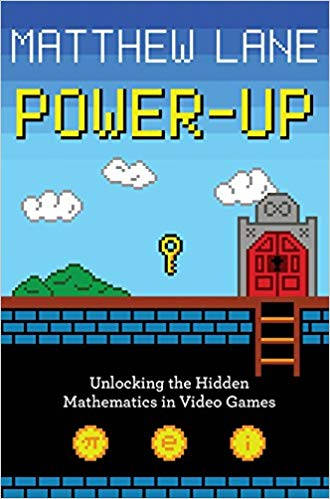| Power-Up: Unlocking the Hidden Mathematics in Video Games |
|
Author: Matthew Lane Math via games - great idea? But how well does it work? Games have indeed altered the minds of generations but I'm not convinced that they have done much for awareness of math among the non-mathematical. I can remember teaching a basic computer science course and getting sidetracked into trigonometry simply because most of the lecture theater wanted to know how to draw a circle as part of a game and then into dynamics to implement a thrown projectile - if only we had thought of throwing a bird! However, these were people interested in implementing games, not just playing them. This book starts out with the premise that the reader is familiar with the outsides of games, not necessarily the insides, and this is where I think things go wrong. But read on this could be the book you are looking for. The first chapter spends time telling the reader that what happens in many simple video games isn't real Newtonian physics. Well yes this is true, but hardly suprising. The last part of the chapter explains how things would look if light were slower than it is and rounds off with an optional look at some of the equations of special relativity. I'm not sure what the average reader is to take from all of this. Chapter 2 is about the difficulties of not quite being random - we don't like the repeats. The number of equations has increased and they are not simple equations but things that look difficult to the non-mathematician. Steven Hawking was told by his publisher that every equation in his book would halve the readership. I would qualify this by "unless the book was aimed at mathematicians". By Chapter 2 this book has enough equations to reduce its lay audience to almost zero. This is not a beginner's book and raises the question why, if you are mathematically inclined, do you need the ideas wrapped up in this loose association with games?
Chapter 3 is an explanation of voting systems motivated by their use in games. This is topical, but difficult, material. The same can be said of Chapter 4 which is about ranking and scoring. Chapter 5 is about pursuit games and the mathematical level again takes a jump. Chapter 6 is about complexity and we learn all about P and NP and the million dollar prize for its solution. For me by now the game aspect of the presentation was now becoming stretched too thin. These ideas are interesting in their own right without needing Kevin Bacon to be in on the action. Chapter 7 introduces friendship models which are a bit like predator-prey dynamics and so in the next chapter we meet chaos theory. Again there are a lot of equations and graphs that are going to put the non-mathematically-able off the entire topic. The final chapter is a meditation on the value of mathematics and games in particular. This is not a controversial issue to the mathematician, but it is to the average non-mathematician who has confused math with arithmetic and mental arithmetic in particular. I fear that this book does little for the reader convinced that they are "no good at math" simply because they cannot do multiplication in their head. There is structure in games and this could be motivational if the math that was derived was turned back into the game and made a better player or a better game, but this isn't the case. You can tell I didn't get on with the book and I'm supposed to be mathematically literate. Strangely I did enjoy parts of it just because I was able to read the equations, but I don't think it will appeal to anyone who isn't math-equipped. It's a well written, well explained book but it misses its target and doesn't make it on to the leaderboard. To keep up with our coverage of books for programmers, follow @bookwatchiprog on Twitter or subscribe to I Programmer's Books RSS feed for each day's new addition to Book Watch and for new reviews.
|
|||
| Last Updated ( Saturday, 19 October 2019 ) |

